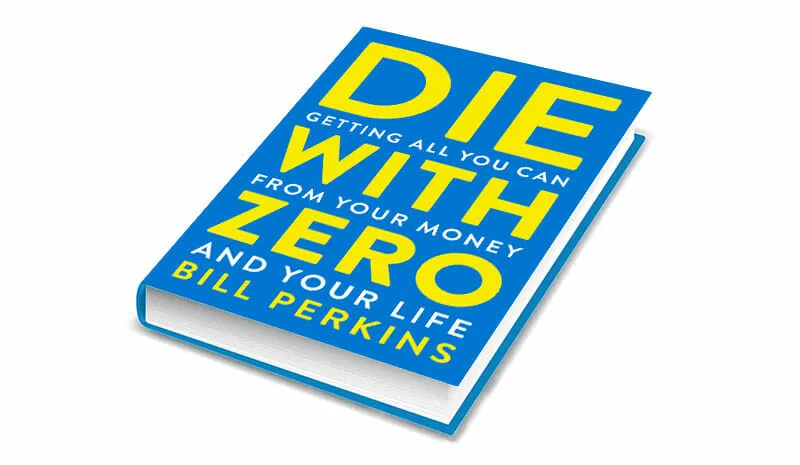
Working at The Motley Fool, a day doesn't go by without reading about the best way to save or invest for retirement. Plus, I absorb all I can about Finishing Rich and being that Rich Dad with the same broad message about embracing compounding, living beneath your means, and just waiting.
So, I was particularly thrown when I picked up Die With Zero, which sucker punches those platitudes and empowers spending to improve life experiences.

5 Agrees ✅ and 3 Disagrees ❌ from Die with Zero
"There is an optimal time, and it is never when you're dead."
❌ Disagree
While I concede the argument that those benefactors (kids or charities) could use money today, I can't bring myself to the point that you should give it away today, as you may still need it tomorrow. I think the issue I'm having is that I hold a strong belief that, first and foremost, your savings can keep you from being a (financial) burden on others.
"The ideal age to inherit money is ... the age range 26 to 35."
✅ Agree
That would have been the most impactful time for receiving a windfall. Those early adulting years can be lean, and early parenting daycare years are unbelievably costly. But, the stronger argument is that this is when you want to start saving to maximize the magic of compounding.
"I went all out, creating the best party my money could buy."
❌ Disagree
Don't get me wrong, we all want to fly everyone you know to the Caribbean, rent out a resort, and throw the biggest blowout 45th birthday that Natalie Merchant has ever seen (who we also have hired to perform at the party). It sounds amazing, but it's a bridge too far for someone who hasn't been living the tenants of this book, only just reading them for the first time.

🎶 Happy 45th Birthday 🎶
"To increase your overall lifetime fulfillment, it's important to have each experience at the right age."
✅ Agree
I instinctively knew but hadn't processed til reading this book that you can outgrow opportunities. Not just physically exerting ones like rock climbing or cliff diving. The idea of staying in hostels and backpacking across Europe sounds epic in your 20s and cringe-worthy in your 60s. Carpe diem.
Worsening health gradually constrains your enjoyment of that wealth."
✅ Agree
Yes. Health is a major factor. 🩺. Money isn't the only thing that burns down in retirement. So too, does time, which goes precipitously faster if and when health conditions arise.
"Leaving money behind amounts to a waste of life energy or to working for free"
❌ Disagree
This argument is made repeatedly in the book, and I bristled each time it was restated. It's too oversimplified an argument. Time can be equated to money for active income, but much wealth grows passively and is not pegged back to an hour worked. I get the spirit of the argument, though, not to be miserly and save everything for the sake of saving.
"Being aware that your time is limited can motivate you to make the most of the time you do have."
✅ Agree
I watched a Youtuber who wears a shirt with an icon of a partially charged battery: it reflects how much of his life is over. It's morose to reflect on how the days are passing by, and as you get past middle age, are now counting down. It is worth recognizing and acknowledging because it can motivate me to stop putting off until tomorrow and get moving on what matters most.
"The business of life is the acquisition of memories. In the end, that's all there is."
✅ So agree
I really like that conclusion. I saw that first-hand as my father was at the end and embracing the memories, the stories, and the photographs of a well-lived life. It's a reminder to me to focus on experiences and that I need to take more videos and pictures. 📷
Overall, a good read; it got me thinking and a bit stirred to action.
★★★★☆
What do you think of these callouts if you have read Die With Zero? And what did you think overall? Did it change you in any way? A few months after reading it, these ideas still live rent-free in my brain. They are nudging me toward being more proactive in ensuring I am living, not just saving.
Disclosures: Please do not mistake this book summary as financial advice. It is a series of opinions on what I read. Further, those opinions are my own and do not reflect the views of my company. Best as I know, my company didn't read this book. Best as I know, my company hasn't read any books because it's a company, and companies are abstract constructs that lack the faculties and consciousness required for reading.